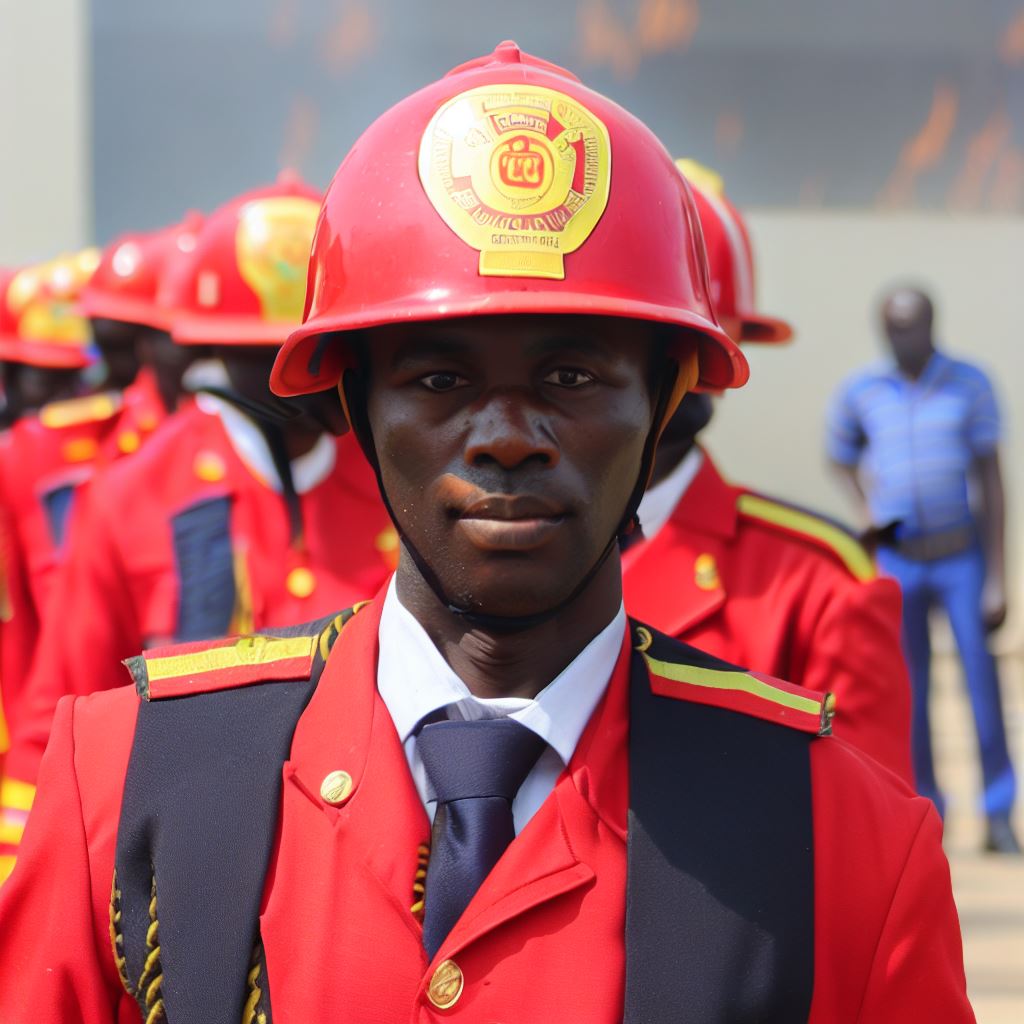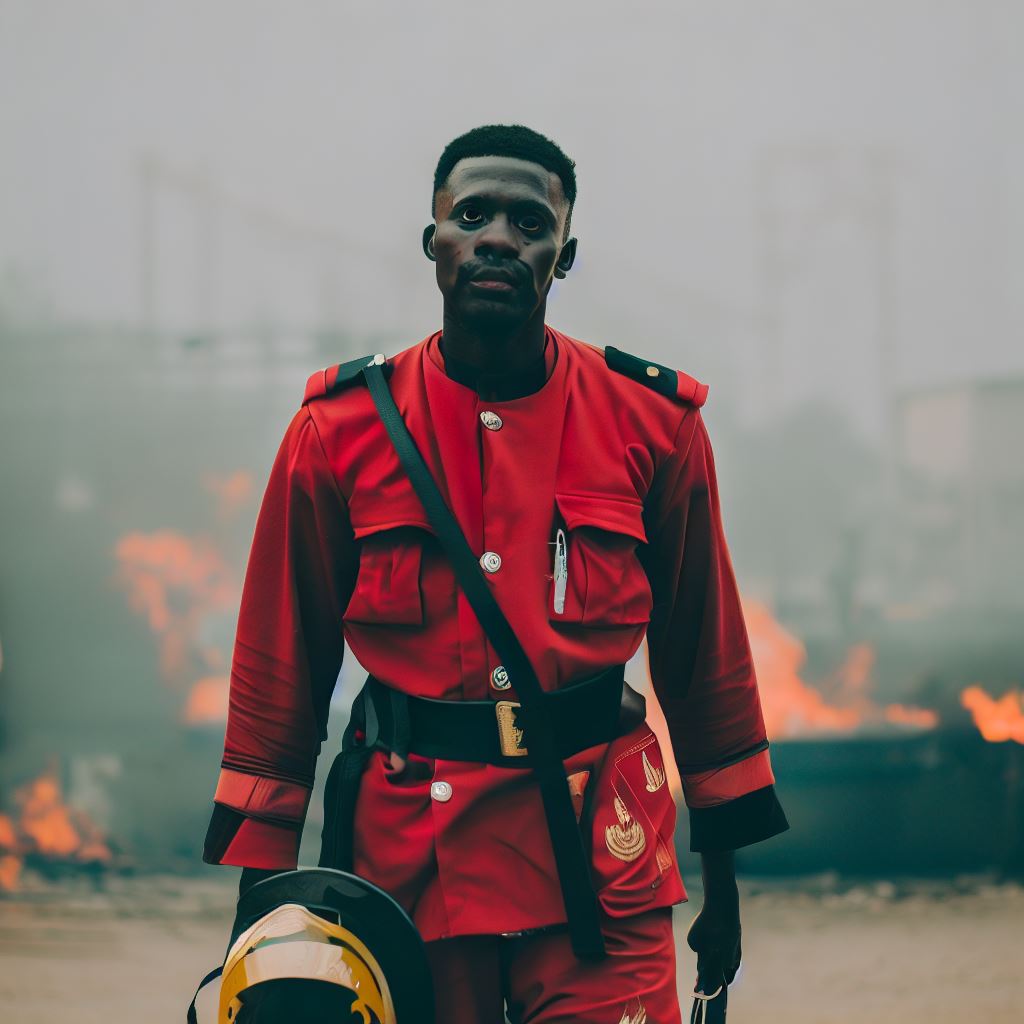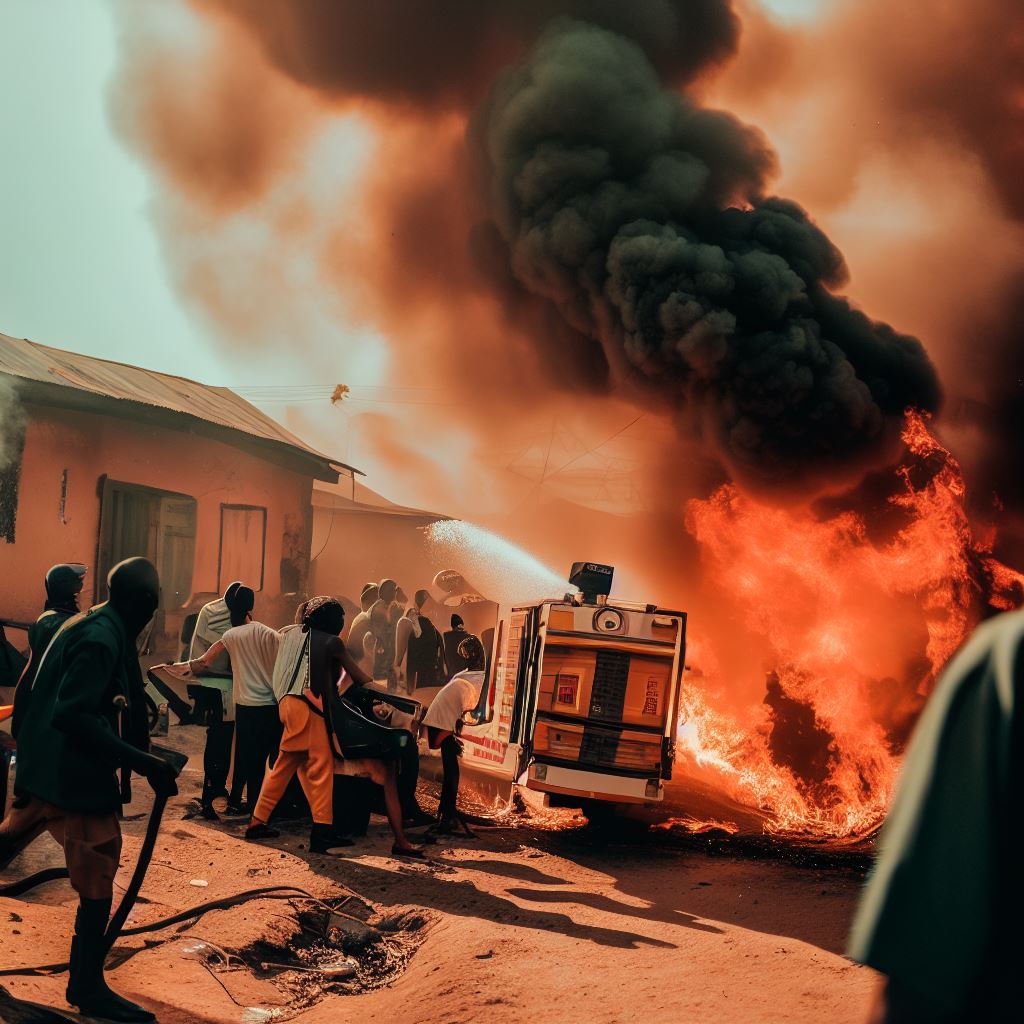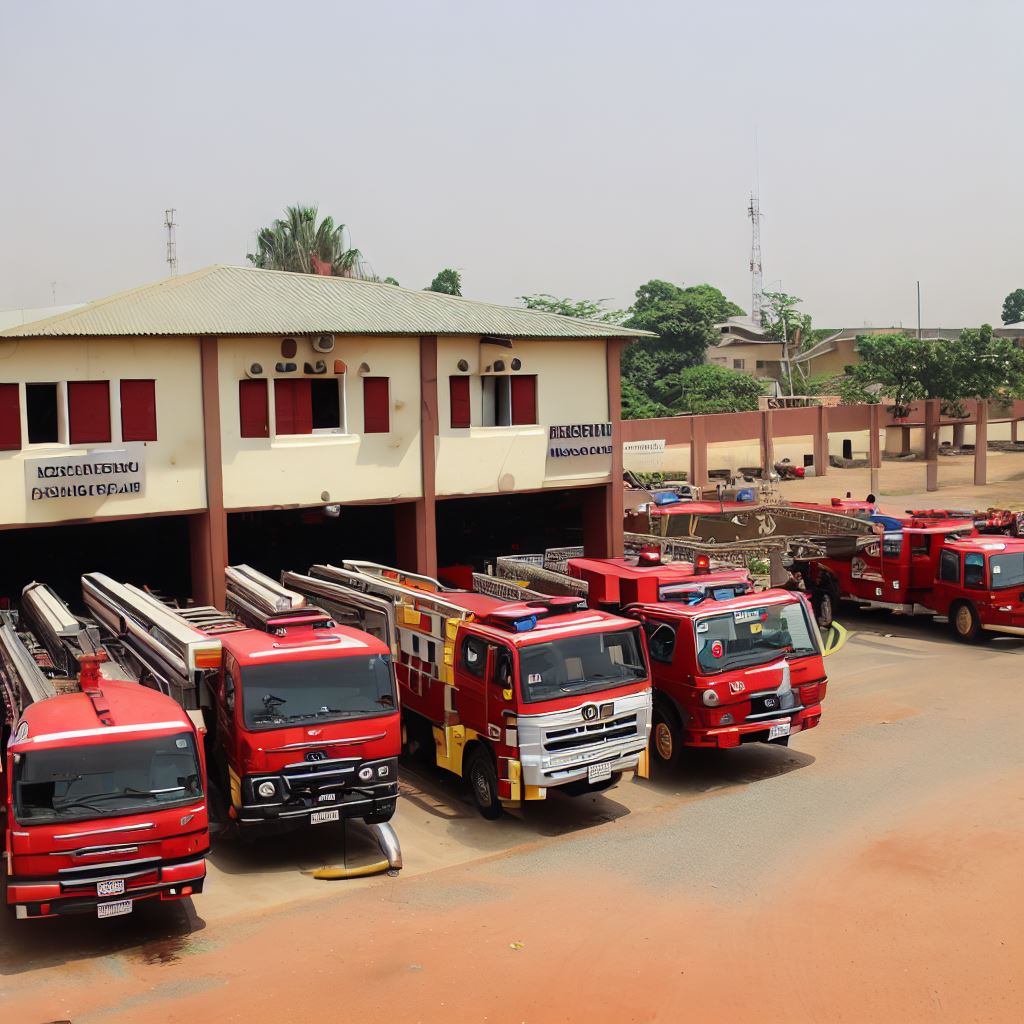Introduction
Becoming a firefighter in Nigeria is an important and relevant topic that needs attention.
Firefighters play a crucial role in ensuring public safety and protecting lives and property.
The process of becoming a firefighter in Nigeria can be challenging but rewarding. It requires dedication, physical fitness, and the ability to handle high-pressure situations.
This guide will provide a step-by-step overview of the requirements and training needed to pursue a career as a firefighter in Nigeria.
Whether it is a passion for serving the community or a desire for a dynamic career, becoming a firefighter in Nigeria can be a fulfilling profession.
This section will outline the necessary steps and provide valuable information for those interested in embarking on this noble and demanding path.
By the end of this guide, readers will have a comprehensive understanding of the journey to becoming a firefighter in Nigeria and be better prepared to take the necessary steps to pursue this career.
Determine if Firefighting is the Right Career Path for You
A. Responsibilities and Challenges of Being a Firefighter
- Firefighters face numerous responsibilities in their line of work.
- They are responsible for protecting lives, property, and the environment from fires and other emergencies.
- Firefighters are the first responders to fire incidents, accidents, and hazardous materials situations.
- They conduct search and rescue operations, treat injured victims, and provide emergency medical assistance.
- They also respond to incidents involving natural disasters, such as floods or earthquakes.
- Firefighters are responsible for educating the community about fire safety and prevention measures.
- They inspect buildings to ensure compliance with fire codes and regulations.
- Firefighters are on call throughout the day and night, ready to respond to emergencies at any given time.
- They must be physically fit and able to withstand strenuous activities, as firefighting involves heavy lifting and long hours.
- Firefighters work under extremely dangerous and life-threatening conditions, requiring them to stay calm and focused in stressful situations.
- They often face high levels of heat, smoke, and toxic gases, putting their own safety at risk.
- Firefighters need to maintain constant communication and coordination with team members to ensure effective response and rescue operations.
- They must continuously update their knowledge and skills through training programs to stay up-to-date with the latest firefighting techniques and equipment.
B. Personal Qualities and Skills Required for the Job
- Physical fitness is one of the crucial qualities needed to become a firefighter.
- Strength and endurance are essential to perform the physically demanding tasks required.
- Excellent communication skills are necessary to effectively communicate with team members, victims, and the public.
- Firefighters need to remain calm under pressure and make quick decisions in emergency situations.
- Problem-solving skills are vital as firefighters need to assess the situation and determine the best course of action.
- Being a team player is essential in firefighting, as firefighters often work in a group to tackle emergencies.
- Firefighters should have good coordination and dexterity to operate equipment and tools efficiently.
- They need to have a strong sense of responsibility and commitment towards saving lives and protecting property.
- Being compassionate and empathetic is important, as firefighters often work with victims who are in distress.
- Firefighters should have a high level of mental and emotional resilience to cope with the stress and trauma they may encounter.
- Leadership qualities are valuable for higher-ranking positions within the firefighting department.
- Firefighters should possess a strong sense of integrity and ethics, as they are trusted with public safety.
- Strong problem-solving and critical thinking skills are necessary for assessing risks and implementing effective strategies.
- Adaptability is crucial as firefighting often requires adjusting to unpredictable and changing situations.
In fact, becoming a firefighter in Nigeria requires a deep understanding of the responsibilities, challenges, and personal qualities needed for the job.
It is a physically demanding and mentally challenging career that demands strength, endurance, and excellent communication skills.
Firefighters play a crucial role in protecting lives, property, and the environment from emergencies, and their dedication to public safety is commendable.
Research the Requirements and Qualifications
When considering a career as a firefighter in Nigeria, it is important to thoroughly research the requirements and qualifications necessary for the job.
Meeting these criteria is essential to increase your chances of success in becoming a firefighter.
A. Educational and physical requirements
To become a firefighter in Nigeria, there are specific educational and physical requirements that must be met.
These include:
- Completing a minimum of secondary school education or its equivalent.
- Having a basic understanding of subjects like English, Mathematics, and Science.
- Being physically fit and capable of performing the demanding tasks required in firefighting.
- Demonstrating good health and passing a medical examination.
Meeting these educational and physical requirements is crucial as they ensure that firefighters have a solid foundation of knowledge and the physical capabilities to effectively carry out their duties.
B. Importance of meeting the criteria
Meeting the criteria set for becoming a firefighter in Nigeria is of utmost importance.
These criteria have been put in place to ensure that only the most qualified individuals are selected for this critical role.
By meeting the requirements, you demonstrate your commitment, dedication, and suitability for the job.
Fulfilling the educational criteria ensures that firefighters possess the necessary academic knowledge to understand fire behavior, hazard mitigation techniques, and emergency response protocols.
It also ensures that they have good communication skills to effectively interact with team members and the public.
The physical requirements are equally important as firefighting is physically demanding.
It requires strength, agility, and stamina to carry heavy equipment, rescue individuals, and combat fires in challenging environments.
Firefighters should also possess the mental and emotional resilience to handle high-stress situations and make quick decisions.
C. Additional certifications and training
In addition to the basic educational and physical qualifications, obtaining additional certifications and training can significantly enhance your chances of becoming a firefighter in Nigeria.
Some beneficial certifications and training programs include:
- First Aid and CPR certification: This demonstrates your ability to provide immediate medical assistance, which is often required in emergency situations.
- Fire Safety and Prevention training: This focuses on fire prevention techniques and equips you with the knowledge to educate the community on fire safety measures.
- Rescue techniques: These programs provide specialized training in rescuing individuals from different hazardous situations such as collapsed buildings or vehicle accidents.
- Advanced firefighting courses: These courses offer in-depth training on advanced firefighting techniques, hazardous material response, and incident command systems.
Obtaining these additional certifications and training not only improves your skills and knowledge but also demonstrates your commitment to professional growth and development in the firefighting field.
In review, researching and fulfilling the requirements and qualifications to become a firefighter in Nigeria is essential.
Meeting the educational and physical criteria not only increases your chances of success but also ensures that you are well-prepared to handle the critical responsibilities of a firefighter.
Additionally, acquiring additional certifications and training can further enhance your skills and make you a more competitive candidate.
So, take the necessary steps, invest in your education and physical fitness, and pursue specialized training to make your dream of becoming a firefighter in Nigeria a reality.
Prepare for the Firefighter Recruitment Process
In Nigeria, the recruitment process for becoming a firefighter involves several stages and assessments.
It is important to be well-prepared for each step in order to increase your chances of success.
Here is an overview of the recruitment process and some tips on how to prepare for the written exam and physical fitness test.
A. Overview of the recruitment process
- Submit an application: Start by submitting your application to the firefighting agency in Nigeria. Ensure all the required documents are attached.
- Written exam: Once your application is reviewed, you will be invited to take a written exam to assess your knowledge and abilities.
- Physical fitness test: If you pass the written exam, you will then undergo a physical fitness test to evaluate your stamina and physical capabilities.
- Interview: Candidates who successfully pass the physical fitness test will be called for an interview to assess their personal qualities, motivation, and suitability for the role.
- Medical examination: Before final selection, a comprehensive medical examination will be conducted to ensure you are physically fit to become a firefighter.
- Training: If you successfully pass all the previous stages, you will be admitted into the firefighting training program.
B. Written exam
- The written exam is designed to test your knowledge and understanding of firefighting techniques, equipment, and safety protocols.
- Study the syllabus: Obtain the syllabus for the exam and make sure to cover all the topics thoroughly.
- Practice sample questions: Solve previous years’ question papers or sample questions to familiarize yourself with the format and possible types of questions.
- Time management: Practice completing the exam within the allocated time to improve your speed and accuracy.
- Seek guidance: If possible, reach out to firefighters or experts in the field to gain insights and advice on how to excel in the written exam.
C. Physical fitness test
- The physical fitness test assesses your overall fitness, endurance, strength, and agility.
- Cardiovascular fitness: Engage in regular cardiovascular exercises, such as running, swimming, or cycling, to improve your stamina.
- Strength training: Incorporate strength training exercises, such as weightlifting or bodyweight exercises, to build your physical strength.
- Agility drills: Practice agility drills like ladder drills or cone drills to improve your agility and coordination.
- Mock tests: Take part in mock physical fitness tests to get a realistic understanding of the test’s requirements.
D. General preparation tips
- Research the agency: Gather information about the firefighting agency in Nigeria to understand their values, vision, and mission.
- Physical conditioning: Start a regular exercise routine well in advance to improve your overall fitness and stamina.
- Stay updated: Keep yourself updated with the latest advancements and techniques in firefighting through books, online resources, or training courses.
- Mental preparation: Develop a positive mindset, stay motivated, and believe in your abilities to go through the recruitment process successfully.
- Professionalism: Maintain a professional tone and demeanor throughout the recruitment process, including during the interview and medical examination.
Preparing for the firefighter recruitment process in Nigeria requires dedication, commitment, and hard work.
y following these tips and being fully prepared, you can enhance your chances of becoming a firefighter and serving your community effectively.
Your journey to becoming a firefighter starts with thorough preparation and a determination to succeed.
Read: Top 10 Schools for Sports Massage Therapy in Nigeria
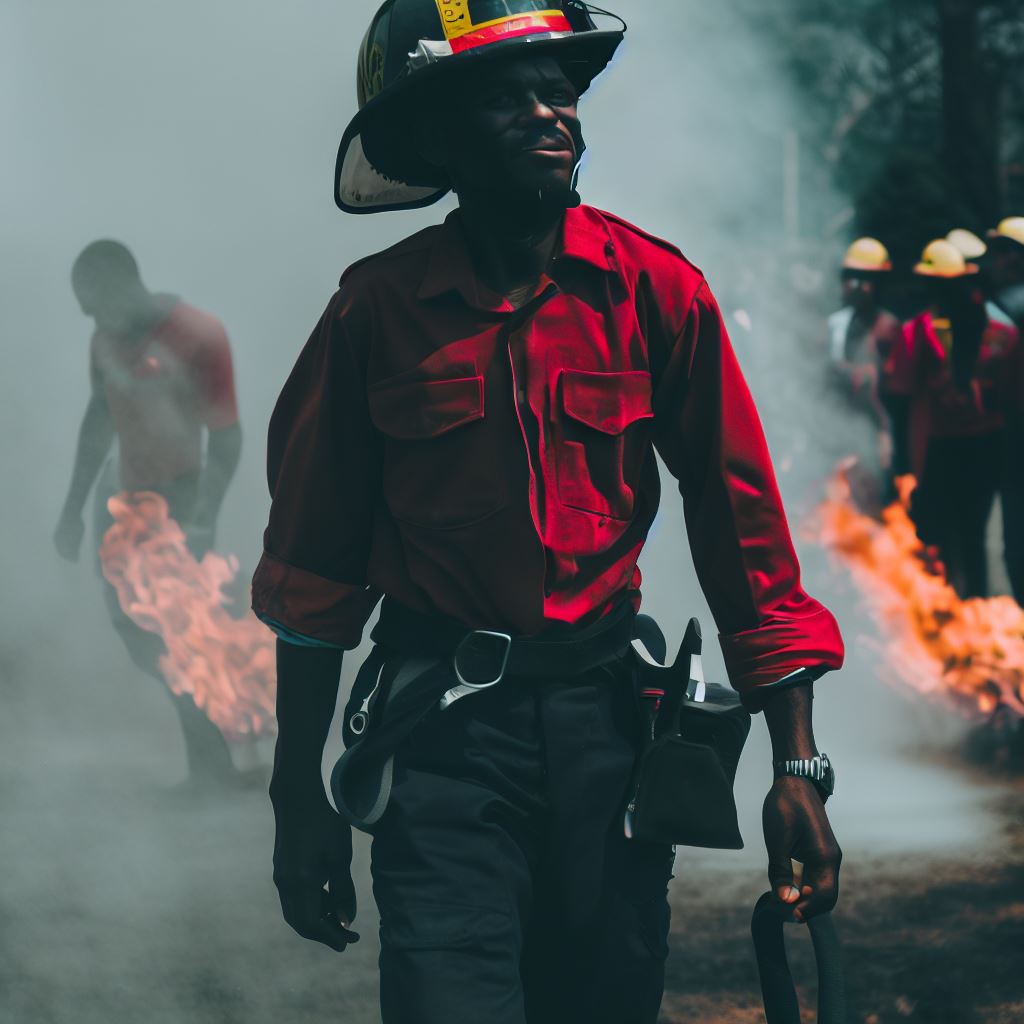
Build Relevant Skills and Experience
A. Importance of gaining relevant experience and training
Gaining relevant experience and training is crucial for anyone aspiring to become a firefighter.
Here are some reasons why it is essential:
- Hands-on experience: Volunteering or interning at local fire departments allows individuals to gain firsthand experience in dealing with emergency situations. This practical experience is invaluable and helps build confidence and skills.
- Training programs: Participating in training programs offered by fire departments or organizations is another excellent way to gain relevant skills. These programs provide both theoretical knowledge and practical training, covering various aspects of firefighting.
- Learn firefighting techniques: By being actively involved in training sessions and practical exercises, aspiring firefighters can learn essential firefighting techniques such as hose operations, search and rescue, and ventilation strategies.
- Enhance physical fitness: Firefighting is physically demanding, requiring individuals to possess excellent stamina, strength, and agility. Volunteering or interning provides an opportunity to improve physical fitness through drills and exercises tailored for firefighting.
- Develop teamwork and communication skills: Firefighting is a team effort, and effective teamwork is vital for success. By working with experienced firefighters, individuals can learn and develop strong communication skills and the ability to collaborate seamlessly with others.
- Gain knowledge of fire safety regulations: Volunteering or interning provides an opportunity to learn about fire safety regulations and procedures. By familiarizing themselves with these regulations, individuals can become well-versed in fire prevention and safety measures.
B. Suggestions for volunteering or interning at local fire departments
- Reach out to local fire departments: Contact your local fire department and express your interest in volunteering or interning. They can provide information on available opportunities and the application process.
- Volunteer as a firefighter’s aide: Many fire departments offer programs where individuals can support firefighters during emergency calls. This role involves tasks like equipment management, traffic control, and providing assistance to firefighters.
- Join a firefighter explorers program: Some fire departments have explorers programs specifically designed for teenagers and young adults interested in becoming firefighters. These programs provide educational and practical experiences related to fire service.
- Participate in community fire prevention campaigns: Join local fire departments in organizing and conducting fire safety education programs within your community. This will not only enhance your knowledge but also demonstrate your commitment to fire safety.
C. Other related opportunities to enhance skills and knowledge
- Emergency medical training: Firefighters often provide emergency medical assistance. Gaining certification in basic first aid, CPR, and other emergency medical training programs can greatly enhance your qualifications.
- Hazardous materials training: Firefighters are often called upon to handle hazardous materials incidents. Obtaining specialized training in this area will enable you to handle such situations with confidence and expertise.
- Additional certifications: Consider pursuing certifications in areas such as fire inspector, fire investigator, or paramedic. These additional certifications can expand your career options within the firefighting field.
Remember, building relevant skills and experience is a continuous process.
Actively seek out opportunities for training, volunteering, and learning to enhance your chances of becoming a successful firefighter in Nigeria.
Read: Understanding the Role of a Sports Massage Therapist in Nigeria
Apply for Firefighter Job Openings
To further your journey towards becoming a firefighter in Nigeria, it is crucial to learn how to navigate the job market and successfully apply for firefighter job openings.
This step requires careful attention to detail and strategic planning.
Below are a few guidelines to help you in this process:
A. Finding job openings in the field
- Monitor government websites, local newspapers, and job portals for firefighter job advertisements.
- Stay updated on social media platforms, such as LinkedIn or Facebook firefighter groups, where job postings are often shared.
- Network with current firefighters or visit fire stations to inquire about upcoming vacancies.
B. Create a resume and cover letter tailored for firefighting positions
- Begin your resume with a professional summary, highlighting your passion for firefighting and any relevant certifications or training you have acquired.
- Emphasize your physical fitness and stamina, as well as your ability to remain calm under pressure.
- Include any previous experience, whether it be volunteer work or internships, that showcases your commitment to public safety.
- Highlight any technical skills that may be valuable in firefighting, such as knowledge of first aid or expertise in using firefighting equipment.
- Be concise and avoid exaggerations; use bullet points to clearly outline your qualifications.
C. Prepare a captivating cover letter
- Address the letter to the appropriate hiring manager or department.
- Begin by expressing your enthusiasm for the opportunity to join the firefighting team.
- Provide a summary of your qualifications and briefly explain how they make you the ideal candidate for the position.
- Share specific examples of how you have demonstrated teamwork, problem-solving, and leadership skills in the past.
- Convey your willingness to undergo any necessary training and dedication to continuous learning in the firefighting profession.
- End the letter with a strong closing statement, expressing your interest in an interview and providing your contact information.
D. Showcase relevant experience and skills
- Highlight any firefighting certifications or training programs you have completed.
- Include any relevant work experience, such as emergency medical technician (EMT) or lifeguard positions.
- Describe any involvement in community service or volunteer work related to firefighting or public safety.
- Emphasize your ability to work well in a team and follow instructions in high-stress situations.
- Discuss any physical fitness accomplishments or participation in sports that require stamina and endurance.
Ultimately, the key to securing a firefighter job is to present yourself as a well-rounded candidate with a genuine passion for serving others and a commitment to public safety.
By following these steps and tailoring your application to each specific opening, you increase your chances of standing out among other applicants.
Remember, becoming a firefighter is a highly competitive process, so it is essential to continuously enhance your skills, knowledge, and physical fitness.
Don’t be discouraged by setbacks or rejections; instead, use them as motivation to keep striving towards your goal. Good luck on your journey to becoming a firefighter in Nigeria!
Read: Education Required for Sports Massage Therapists in Nigeria
Prepare for Firefighter Interviews
A. Common interview questions for firefighting positions
- Why do you want to become a firefighter?
- How do you handle stressful situations?
- Can you describe a time when you worked effectively as part of a team?
- What are your strengths and weaknesses?
- How do you prioritize tasks in an emergency situation?
- Have you had experience dealing with difficult or aggressive people?
B. How to answer these questions effectively
- For the question about why you want to become a firefighter, express your passion for helping others and your dedication to public service.
- When discussing how you handle stressful situations, emphasize your ability to stay calm, think quickly, and make well-informed decisions.
- When describing a time when you worked effectively as part of a team, provide a specific example that demonstrates your communication and cooperation skills.
- Regarding your strengths and weaknesses, focus on qualities that are relevant to firefighting, such as physical fitness, problem-solving abilities, and a dedication to ongoing learning and improvement.
- When explaining how you prioritize tasks in an emergency situation, emphasize the importance of assessing risks and allocating resources effectively.
- When discussing experience dealing with difficult people, highlight your ability to remain calm, diffuse tension, and maintain professionalism.
C. The importance of practicing and researching the fire department
Preparing for a firefighter interview involves more than just answering a set of questions. It is crucial to familiarize yourself with the specific fire department you are applying to.
Research their mission, values, recent achievements, and challenges they may be facing. This knowledge will demonstrate your genuine interest and commitment to becoming a part of their team.
Additionally, practicing your responses to common interview questions is vital.
Consider conducting mock interviews with family or friends, or even recording yourself answering questions and evaluating your performance.
This practice will help you improve your communication skills, boost your confidence, and ensure that you are able to articulate your thoughts effectively during the actual interview.
Furthermore, it is essential to dress professionally for the interview, arrive on time, and bring any required documents or certifications.
hese small details reflect your professionalism and preparedness.
Remember, the interview is an opportunity for the fire department to assess your fit for the role, and for you to showcase your qualifications and commitment to public service.
Prepare thoroughly, be confident but humble, and demonstrate your genuine passion for the role and willingness to contribute to the community as a firefighter.
Read: Sports Massage Therapy in Nigeria: Salaries and Benefits
Conclusion
Becoming a firefighter in Nigeria can be achieved by following these step-by-step guidelines.
First, obtain a secondary education certificate. Next, enroll in a firefighting training program and complete the necessary courses.
Then, acquire practical experience through internships and volunteering. After that, obtain the required certifications and licenses.
Finally, apply for firefighting positions in Nigeria and continue to learn and grow in the field.
Now is the time to take action and pursue your dream of becoming a firefighter in Nigeria. Don’t let anything hold you back.
It won’t be an easy journey, but the impact you can make in saving lives and protecting communities is worth it.
If you are passionate about this career, don’t hesitate to go for it.
If you need further guidance or resources, there are various places to seek support.
Reach out to local fire departments in Nigeria to inquire about any upcoming recruitment processes or to gain insights from experienced firefighters.
Additionally, online platforms and forums can provide valuable information and allow you to connect with others in the firefighting community.
Remember, becoming a firefighter is not just a job; it is a noble profession. It requires courage, dedication, and a strong sense of responsibility.
By following the steps outlined in this guide and pursuing your dreams, you can contribute to the safety and well-being of your community.
Start your journey today and make a difference as a firefighter in Nigeria.

